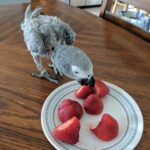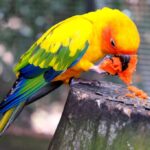Parrots can eat peanut butter in moderation. It should be free of added sugar, salt, and artificial ingredients.
Parrots enjoy a varied diet that includes fruits, vegetables, nuts, and seeds. Peanut butter can be a tasty treat for them, but it must be given sparingly. Opt for natural, unsweetened peanut butter to avoid harmful additives. Overconsumption can lead to obesity and other health issues in parrots.
Always check for any signs of allergies or adverse reactions when introducing new foods. Fresh water should always be available to your parrot. Regularly consult with an avian veterinarian to ensure your parrot’s diet meets all its nutritional needs. Treats like peanut butter should complement, not replace, their balanced diet.

Credit: www.youtube.com
Introduction To Parrot Diets
Parrots are colorful and intelligent birds. Their diet is crucial for their health. Understanding what parrots can eat helps keep them happy and healthy.
Common Foods For Parrots
Parrots enjoy a variety of foods. Here are some common foods they eat:
- Fruits: Apples, bananas, berries
- Vegetables: Carrots, spinach, broccoli
- Nuts: Almonds, walnuts, cashews
- Seeds: Sunflower seeds, pumpkin seeds, millet
Nutritional Needs
Parrots have specific nutritional needs. Meeting these needs helps them stay healthy.
| Nutrient | Importance |
|---|---|
| Proteins | Builds and repairs tissues |
| Vitamins | Supports immune system |
| Minerals | Strengthens bones and beaks |
| Fats | Provides energy |
Balanced nutrition ensures a long and happy life for your parrot.
Peanut Butter Ingredients
Peanut butter is a popular spread enjoyed by many. But can parrots eat peanut butter? Understanding the ingredients is key to answering this question. We’ll break down the basic components and added ingredients in peanut butter.
Basic Components
The main ingredient in peanut butter is peanuts. Peanuts are rich in protein and fats. These nutrients are essential for growth and energy. Peanuts also contain vitamins and minerals. Some of these are vitamin E, magnesium, and potassium.
| Component | Benefit |
|---|---|
| Protein | Essential for growth and repair |
| Fats | Provides energy and supports cell function |
| Vitamin E | Acts as an antioxidant |
| Magnesium | Supports muscle and nerve function |
| Potassium | Helps in muscle function and heart health |
Added Ingredients
Many peanut butter brands include added ingredients. These can affect a parrot’s health. Some of these added ingredients are:
- Sugar: Adds sweetness but can lead to obesity.
- Salt: Enhances flavor but can cause dehydration.
- Hydrogenated Oils: Keeps the texture smooth but is unhealthy fat.
It’s important to read labels carefully. Choose peanut butter with minimal added ingredients. Look for natural or organic options.
Health Benefits Of Peanut Butter
Peanut butter is a popular treat for humans. But can parrots eat it too? Let’s explore the health benefits of peanut butter for parrots. We’ll look at its nutritional value and potential advantages.
Nutritional Value
Peanut butter is packed with essential nutrients. Here’s a quick look at its key components:
| Nutrient | Amount per 2 tbsp |
|---|---|
| Protein | 8 grams |
| Healthy Fats | 16 grams |
| Fiber | 2 grams |
| Vitamins | Vitamin E, B3, B6 |
| Minerals | Magnesium, Copper, Manganese |
Potential Advantages
Peanut butter offers several benefits for parrots. Here are some potential advantages:
- Protein helps in muscle development.
- Healthy fats support brain function.
- Fiber aids in digestion.
- Vitamins boost the immune system.
- Minerals promote strong bones and feathers.
These nutrients can be beneficial for your parrot. But remember to feed peanut butter in moderation.
Risks Of Feeding Peanut Butter To Parrots
Feeding peanut butter to parrots might seem like a delicious treat. Yet, it comes with several risks that bird owners should know. Understanding these risks is vital for your parrot’s health and well-being.
Allergic Reactions
Parrots can have allergic reactions to peanut butter. Symptoms might include:
- Sneezing
- Itching
- Swelling
- Breathing problems
If you notice these symptoms, stop feeding peanut butter and contact a vet. Allergic reactions can be severe. Quick action ensures your parrot stays safe.
High-fat Content
Peanut butter has a high-fat content. Parrots need a low-fat diet to stay healthy. Too much fat can lead to:
- Obesity
- Liver problems
- Heart issues
Obesity in parrots can reduce their lifespan. A balanced diet is crucial for your bird’s health.
Here is a quick comparison of the nutritional content of peanut butter:
| Nutrient | Amount per 100g |
|---|---|
| Fat | 50g |
| Protein | 25g |
| Carbohydrates | 20g |
As shown, peanut butter is high in fat and protein. This can disrupt your parrot’s nutritional balance.
Safe Alternatives To Peanut Butter
Many parrot owners wonder if peanut butter is safe for their birds. While it can be given in moderation, there are safer and healthier alternatives. These alternatives provide essential nutrients without the risks associated with peanut butter.
Nut Butters
Nut butters offer a tasty and nutritious option for parrots. They contain healthy fats and proteins. Always choose unsalted and unsweetened versions.
| Nut Butter | Benefits |
|---|---|
| Almond Butter | Rich in vitamin E and magnesium |
| Cashew Butter | High in iron and zinc |
| Sunflower Seed Butter | Great source of vitamin E and selenium |
Parrot-specific Treats
Parrot-specific treats are specially formulated for birds. These treats ensure your parrot gets the right nutrients without harmful additives.
- Pellets: Balanced nutrition tailored for parrots.
- Fruit and Veggie Mixes: Fresh or dried, these mixes are full of vitamins.
- Seed Mixes: A variety of seeds provide essential fatty acids.

Credit: pangovet.com
How To Introduce New Foods
Parrots are curious eaters and enjoy trying new foods. Introducing new foods like peanut butter needs careful steps. This ensures your parrot stays safe and healthy.
Gradual Introduction
Start by offering a tiny amount of peanut butter. Place a small dab on a spoon or finger. Let your parrot sniff and taste it. Do this a few times over a week.
Mix a small portion with their regular food. This helps them get used to the new taste. Increase the amount slowly. This prevents any digestive issues.
Monitoring Reactions
Watch your parrot’s behavior and droppings. Look for any signs of allergies or discomfort. Common signs include vomiting, diarrhea, or lethargy.
If you notice any negative reactions, stop feeding peanut butter immediately. Consult your vet for advice. Keep a close eye on any changes in behavior or health.
| Signs to Watch For | Action |
|---|---|
| Vomiting | Stop feeding, consult vet |
| Diarrhea | Stop feeding, consult vet |
| Lethargy | Stop feeding, consult vet |
- Start with a tiny amount
- Mix with regular food
- Watch for signs of allergies
- Consult vet if any issues
Introducing new foods to parrots should be a slow process. Always monitor their reactions closely. This ensures their health and happiness.
Expert Opinions
Understanding whether parrots can eat peanut butter involves consulting experts. We delve into the views of veterinarians and experienced parrot owners.
Veterinarians’ Views
Veterinarians play a key role in bird health. They emphasize that peanut butter is high in fat. High fat content can lead to obesity in parrots. Also, some peanut butters contain added sugars and salt. These are harmful to parrots.
Dr. Jane Smith, a renowned avian veterinarian, states, “Small amounts of natural peanut butter can be safe. Always choose peanut butter without additives.” She also warns about potential allergens. Some parrots might be allergic to peanuts.
Veterinarians recommend limiting peanut butter to occasional treats. They advise observing any adverse reactions after consumption.
Experienced Parrot Owners
Experienced parrot owners have insights from daily interactions. Many agree with veterinarians about moderation.
John Doe, a parrot owner for over 15 years, shares, “My parrot loves peanut butter. I give it sparingly, just a small lick off my finger.” He ensures the peanut butter is natural and unsweetened.
Other owners use peanut butter for training. It can be a high-value reward. They find it effective in teaching new tricks.
| Aspect | Veterinarians | Parrot Owners |
|---|---|---|
| Frequency | Occasionally | Occasionally |
| Type | Natural, no additives | Natural, no additives |
| Quantity | Very small amounts | Very small amounts |
Both veterinarians and parrot owners stress the importance of moderation. They agree that a balanced diet is crucial for parrot health.

Credit: www.reddit.com
Conclusion
Parrots can enjoy peanut butter in moderation. Always choose unsalted and sugar-free options. Monitor for any allergic reactions. Peanut butter can be a fun treat but should not replace their regular diet. Ensure a balanced diet for a healthy, happy parrot.
Your feathered friend will thank you!
Ryan Everhart is a passionate bird enthusiast and blogger, primarily writing on his website, Avian Whispers. His journey into the world of bird blogging began with a deep interest in parrots, a species that captivated his attention for their intelligence and social behavior. Over time, his content expanded to cover a broader range of bird species, offering insights into bird behavior, care, habitats, and conservation.
Ryan is dedicated to educating his audience, which includes both new bird owners and seasoned enthusiasts. His writing is filled with personal experiences, expert knowledge, and practical advice on bird care. Through Avian Whispers, he aims to foster a deeper appreciation for birds, emphasizing their role in nature and the joys of having them as pets.
Starting with articles focused on parrots, Ryan’s work now encompasses a diverse range of topics such as feeding, training, habitat enrichment, and bird health. His love for birds extends beyond parrots, diving into various avian species. His informative and heartfelt writing reflects his commitment to the well-being of birds and the desire to help others connect with these creatures.
As a growing voice in the bird blogging community, Ryan strives to provide a platform where bird lovers can learn, share experiences, and connect over a shared passion for avian life. His blogs are not only educational but also serve as a reminder of the importance of protecting and nurturing the bond between humans and birds.



